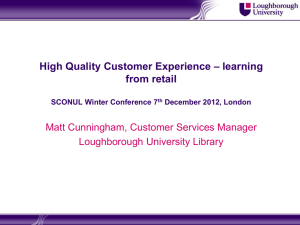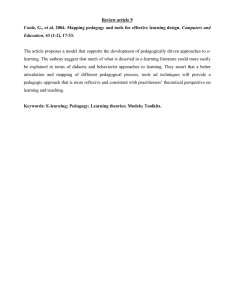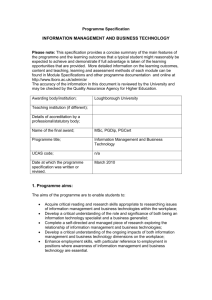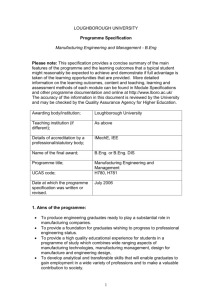Chris Szejnmann Department of Politics, History & International Relations 14 September 2010
advertisement
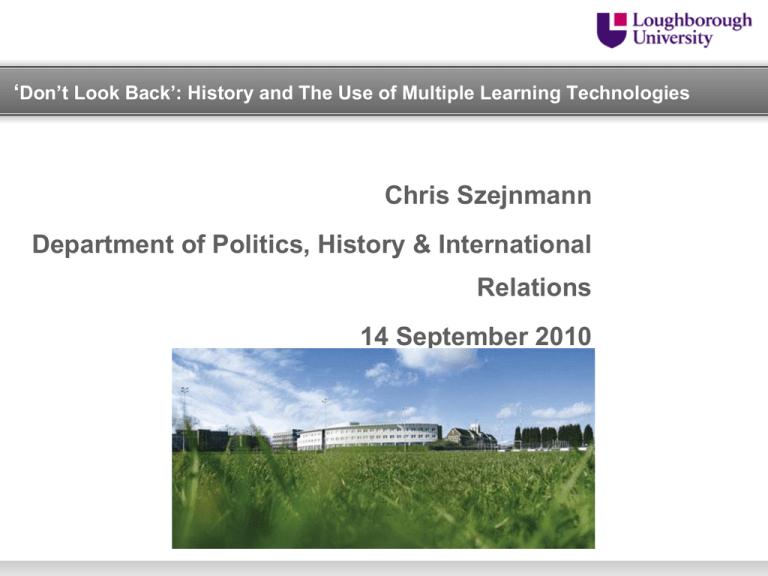
‘Don’t Look Back’: History and The Use of Multiple Learning Technologies Chris Szejnmann Department of Politics, History & International Relations 14 September 2010 some questions for you... Internet use in the United Kingdom: How many users are there per 100 inhabitants in 2009? 1. 2. 3. 4. 5. 56 65 73 84 92 some questions for you... ‘Don’t throw technology into the classroom and hope for good things. Focus on the change in pedagogy, not the technology.’ (Tapscott, Grown Up Digital) 1. Agree 2. Disagree some questions for you... ‘Cut back on lecturing: You don’t have all the answers and “Broadcast Learning” does not work for this generation.’ 1. Agree 2. Disagree some questions for you... ‘Empower students to collaborate.’ 1. Agree 2. Disagree some questions for you... ‘Focus on lifelong learning, not teaching to the test.’ (Tapscott, Grown Up Digital) 1. Agree 2. Disagree some questions for you... ‘Developments in ICT and e-learning will require me to reinvent myself as a teacher, professor, or educator.’ (Tapscott, Grown Up Digital) 1. Agree 2. Disagree background: Loughborough, History, ICT & e-learning History at Loughborough revolutionary developments in ICT and e-learning background: Loughborough, History, ICT & e-learning QAA Benchmark Statement for History (2007) new government: ‘renewed emphasis on teaching’ Martin Hall: lure of technology; focus on pedagogy Angela McFarlane: step back from technology; reflect on how we want to use it; ‘technoromanticism’ Marc Prensky (Teaching Digital Natives): pedagogy to become a partnership between students and educators Multiple Learning Technologies in History at Lboro why did we introduce what, and what were the outcomes?; activities: Lecture capture (Echo360); Audience Response System; Video Presentations and Video Feedback; SMS-texting; objectives: improving student engagement, assessment, feedback; overall: extremely positive feedback from students about teaching innovation Multiple Learning Technologies in History at Lboro outcomes/findings: Lecture Capturing offered students a level playing field in mastering complex content; allowed access of lecture material at any time, and was particular useful for revision; provided a useful facility for dyslexic students, those with hearing difficulties, and those who find it difficult to focus for 50 minutes; Reflections about LC (including demo); see http://curve.coventry.ac.uk/cu/items/e27e76ac-f3cc-2ceb-597b1b7acb84cdaf/1/Chris%20Szejnmann%20and%20Marcus%20Collins%20CG%20Exemplar_HTML.zip/chris_marcus_lough borough_cg0_01.htm?tempwn.b=access%2Fcontribute.do Multiple Learning Technologies in History at Lboro outcomes/findings: Audience Response System enhanced student interaction; improved attentiveness; brought some fun into teaching; engaged passive listeners; allowed immediate formative feedback; enabled us to identify weaknesses/lack of knowledge amongst students Multiple Learning Technologies in History at Lboro outcomes/findings: SMS (text) messaging allowed us to boost student morale, make them feel looked after, and allowed us to give tips for exam revision Multiple Learning Technologies in History at Lboro outcomes/findings: Video Presentations and Feedback time saving & controlled assessment; creative alternative; presentation style can be assessed; presentations can be made available; video feedback offers a personal and informal feedback Multiple Learning Technologies in History at Lboro other initiatives podcasting; History Timeline: interactive History Resource; (BBC British History timeline: Facebook group for incoming History students: ) http://www.bbc.co.uk/history/british/launch_tl_british.shtml http://www.facebook.com/n/?group.php&gid=153403264671162&mid=2e1e913G5af32d22e963G7e04bfG6&bcode=gf77X&n_m=c.w.szejnmann%40 lboro.ac.uk part of a bigger project attempting to make use of time outside teaching term conclusions and reflections... ‘Don’t throw technology into the classroom and hope for good things. Focus on the change in pedagogy, not the technology.’ ‘Cut back on lecturing: You ‘don’t have all the answers and “broadcast learning” does not work for this generation.‘ conclusions and reflections... Broadcast Learning versus Interactive Learning (Tapscott, Grown Up Digital) Broadcast Learning Teacher-centred One-size-fits-all Instruction: learning about Individualistic learning Interactive Learning Learner-centred One-size-fits-one Discovery: learning to be Collaborative learning ‘Developments in ICT and e-learning will require me to reinvent myself as a teacher, professor, or educator.’ questions? c.w.szejnmann@lboro.ac.uk
